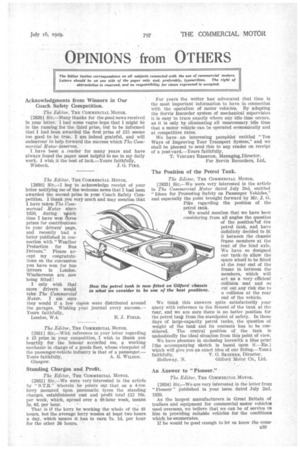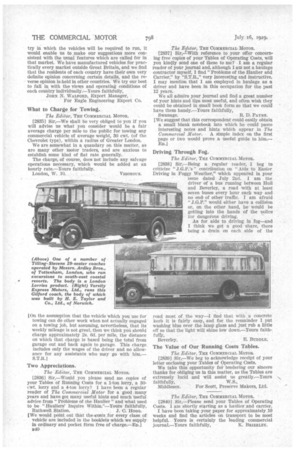OPINIONS from OTHERS Acknowledgments from Winners in Our Coach Safety Competition.
Page 65

Page 66

If you've noticed an error in this article please click here to report it so we can fix it.
The Editor, THE COMMERCIAL MOTOR.
[2829] Sir,—Many thanks for the good news received in your letter. I had some vague hope that I -Might be in the running for the third prize, but to be informed that I had been awarded the first prize of £15 seems too good to be true. I am indeed grateful, and will endeavour to help forward the success which The Commercial Motor deserves.'
I_ have been a reader for many years and have always found the paper most helpful to me in my daily work. I wish. it the best of luck.—Yours faithfully,
Wisbech. J. G. PIKE.
The Editor, THE COmmERCIAL MOTOR.
[28301 Sir,—I beg to acknowledge receipt of your letter notifying me of the welcome news that I had been awarded the second prize in your Coach Safety Competition. I thank yOu very much and may mention that I have taken The Commercial Motor since 1920, during which time I have won three prizes for contributions to your drivers' page, and recently had a letter published in connection with "Weather Protection for Bus Drivers.' Please accept my congratulations on the concession you have won for bus drivers in London. Windscreens are now being fitted !
I only wish that more drivers would take The Commercial MotOr. I am sure they would if a few copies were distributed around the garages. Wishing your journal every success.— Yours faithfully, London, W.4. E. J. FIELD.
. The Editor, THE COMMERCIAL MOTOR.
[28311 Sir,--With reference to your letter regarding a £5 prize in your competition, I wish to thank you heartily for the honour accorded me, a working mechanic in charge of a goods fleet, whose viewpoint of the passenger-vehicle industry is that of a passenger.—
Yours faithfully, A. R. WILSON. Glasgow.
Standing Charges and Profit.
The Editor, THE COMMERCIAL MOTOR.
[2832] Sir,--We were very interested in the article by " S.T.R." wherein he points Out that on a 4-ton lorry mounted upon pneumatic tyres the standing charge's, establishment cost and profit total £12 16s. per week, which, spread over a 48-hour week, means 5s. 4d. per hour.
That is if the lorry be working the whole of the 48 hours, but the average lorry wastes at least two hours a day, which means it has to .earn 7s. id. per hour
for the other 36 hours. •
For years the writer has advocated that time is the most important information to have in connection with the operation of motor vehicles. By adopting the Servis Recorder system of mechanical supervision it is easy to trace exactly where any idle time occurs, as it is only, by eliminating all unnecessary, idle time that a motor vehicle can be operated economically and at competitive rates.
We have an interesting pamphlet entitled "Ten Ways of Improving Your Transport System," and we shall be pleased to send this to any reader on receipt of a post-card.—Yours faithfully, T. VINCENT REDSTON, Managing,Director, For Servis Recorders, Ltd.
The Position of the Petrol Tank.
Tile Editor, THE COMMERCIAL MOTOR.
[28331 Sir,---We were very interested in the article in The Commercial Motor dated July 2nd, entitled "Ideas for Promoting Safety on Passenger Vehicles," and especially the point brought forward by Mr. J. G. Pike regarding the position of the petrol tank.
We would mention that we have been considering from all angles the question of the positiontof the petrol tank, and have definitely decided to fit it between the chassis frame members at the rear of the hind axle. We have so designed our tank to allow the spare wheelto be fitted at the rear end of the frame in between the members, which will act as a very efficient collision mat and so cut out any risk due to a collision at the rear end of the vehicle.
We think this answers quite satisfactorily your query with reference to the fitment of the tank at the rear, and we are sure there is no better position for the petrol tarilt from the standpoint of safety. In these days of large-capacity petrol tanks, the question of weight of the tank and its contents has to be considered. The central position of the tank is undoubtedly the ideal situation from this point of view.
We have pleasure in enclosing herewith a blue print [the accompanying sketch is based upon it.—En.') which will give you an exact idea of our fitting.—Yours faithfully, V. 0. SKINNER, Director, Holloway, N. Gilford Motor Co., Ltd.
An Answer to "Pioneer."
The Editor, THE COMMERCIAL MOTOR.
[2834] Sir,—We are very interested in the letter from " Pioneer " published in your issue dated July 2nd,
1929.
As the largest manufacturers in Great Britain of trailers and equipment for commercial motor vehicles used overseas, we believe that we can be of service to him in providing suitable vehicles for the conditions which he enumerates.
If he would be good enough to let us know the come e39
try in which the vehicles will be required to run, it would enable us to make our suggestions more consistent with the usual features which are called for in that market. We have manufactured vehicles for practically every market outside Great Britain, and we find that the residents of each country have their own very definite opinion concerning certain details, and the reverse opinion is held in other countries. We try our best to fall in with the views and operating conditions of each country individually.—Yours faithfully,
JOHN N. WALFoRD, Export Manager, For Eagle Engineering Export Co.
What to Charge for Towing.
The Editor, THE COMMERCIAL MOTOR.
[2835] Sir,—We shall be very obliged to you if you will advise us what you consider would be a fair average charge per mile to the public for towing any commercial vehicle of average weight, 30 cwt. (of the Chevrolet type), within a radius of Greater London.
We are somewhat in a quandary on this matter, as are many other motor traders, and are anxious to establish some kind of fiat rate generally.
The charge, of course, does not include any salvage operations necessary, which would be added at an hourly rate.—Yours faithfully.
London, W. 10. • VIGOROUS.
[On the assumption that the vehicle witch you use for towing can do other work when not actually engaged on a towing job, but assuming, nevelt teless, that its weekly mileage is not great, then we think you should charge approximately 2s. 6th per mile, the distance on which that charge is based being the total from garage out and back again to garage. This charge. includes only the wages of the driver and no allowance for any assistants who may go with him.— S.T.R.]
Two Appreciations. • The Editor, THE COMMERCIAL MOTOR.
r283Q] Sir,—Would you please send me copies of your Tables of Running Costs for a 1-ton lorry, a 30cwt. lorry and a 4-ton lorry? I have been a regular reader of The Commercial Motor or a good many years and have got many useful hints and much useful advice froth "Problems of the Haulier" and what used to be "Hauliers' Inquire Within."—Yours faithfully,
Ruthwell Station. • J.•C. HOGG.
[We would point out that the.costs for every class of vehicle are included in the booklets which we supply in ordinary and pocket form free of charge—ED.] B40
The Editor, THE COMMERCIAL MOTOR.
[2837] Sir,.-.With reference to your offer concerning freecopies of your Tables of Operating Costs, will you kindly send one of these to Inc? I am a regular reader of your journal and, although I am not a haulage contractor myself, I find Problems of the Haulier and Carrier," by "S.T.R.," very interesting and instructive. I may mention that I am employed in haulage as a driver and have been in this occupation for the past 12 years.
We all admire your journal and find a great number of your hints and tips most useful, and often wish they could be obtained in small book form so that we could have them handy.—Yours faithfully, Swanage. It. D. PAYNE.
[We suggest that this correspondent could easily obtain a small blank notebook into which be could paste interesting notes and hints which appear in The Commercial Motor. A simple index on the first page or two would prove a useful guide to him.— Driving Through Fog.
The Editor, TEE COMMERCIAL MOTOR.
[2838] Sir,—Being a regular leader, I beg to criticize " J.G.P.'s " contribution on "Aids to Easier Driving in Foggy Weather," which appeared in your issue dated July 2nd. I am tile driver of a bus running between Hull and Beverley, a road with at least seven buses every hour each way and no end of other traffic. I am afraid " J.G.P." would either have a collision or, on the other hand, he would be getting into the hands of the uoliee tor dangerous driving.
As for aids to driving in fog—and I think we get a good share, there being a drain on each side of the
road most of the way—I find that with a concrete kerb it is fairly easy, and for the remainder I put washing blue over the lamp glass and just rub a little off so that the light will shine low down.—Yours faithfull.
Beverley. E. BUDDLE.
The Value of Our Running Costs Tables.
The Editor, THE COMMERCIAL MOTOR,
[2839] Sir,—We beg to acknowledge receipt of your letter enclosing your Tables of Operating Costs.
We take this opportunity for tendering our sincere thanks for obliging us in this matter, as the Tables are extremely lucid and will assist us greatly.—Yours faithfully,
Middlesex. ' For Scott, Preserve Makers, Ltd.
The Editor, THE COMMERCIAL MOTOR.
[2840] Sir,—Please send your Tables of Operating Costs. I am shortly starting as a haulier and carrier.
I have been taking your paper for approximately 10 weeks and find the articles on transport to be most helpful. Yours is certainly the leading commercial journal.—Yours faithfully, K. BRIERLEY.




















































































































